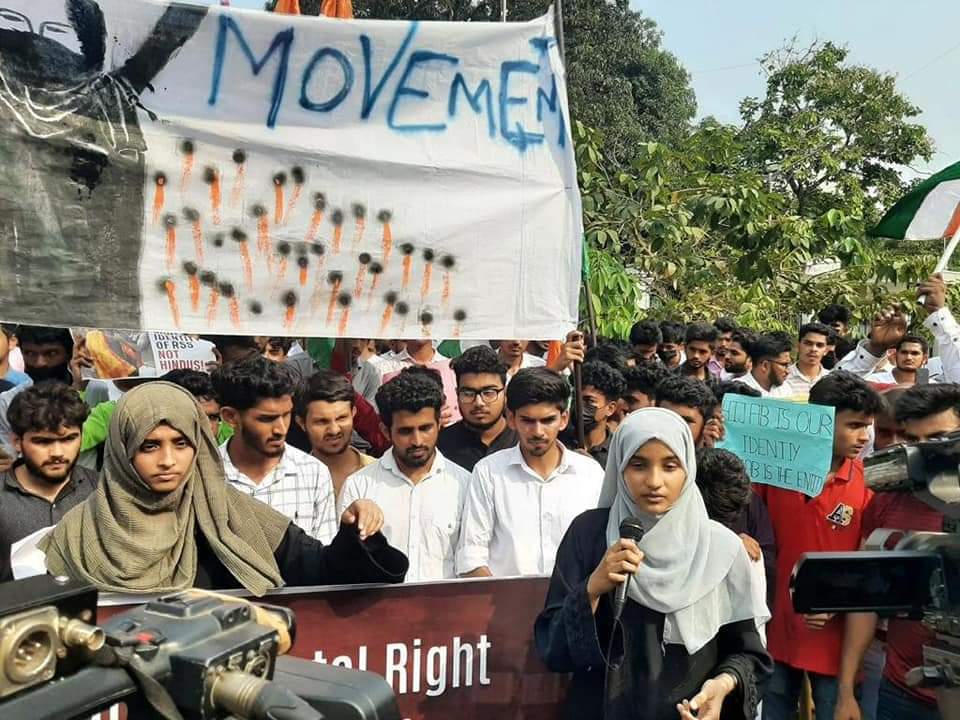Karnataka students forced to miss exam as SC defers hearing in Hijab row
With the Supreme Court rejecting petition by Karnataka students to take up their challenge of the Karnataka High Court order on Hijab ban, uncertainty clouds the future of several Muslim girl students in government-run schools in the southern state since they are bound to miss the annual examinations that are about to commence from next week.
On Thursday, a bench of the top court, led by Chief Justice of India, N V Ramanna rejected demand for urgent listing and told the petitioners’ advocate “not to sensationalise” the matter.
The Karnataka High Court’s order, upholding the ban imposed by the state government, has come in for sharp criticism from civil society groups as well as lawyers, who believe that the court failed to protect the rights of the citizen as guaranteed by the Constitution.
“The judgement is totally illegal. The essentiality of the Hijab is not an issue at all when it comes to uniforms. Let’s suppose it is not essential, but it’s a sincerely held personal belief that is good enough for protection under Article 25 of the Constitution. The right to religion covers not only the essential things it also covers bonafide, personal beliefs and practices. No one can deny that a Muslim girl or woman can legitimately say I think it is optional in Islam but I want to follow it, because I believe it to be right to follow it,” Colin Gonsalves, Founder of Human Rights Law Network (HRLN) and Senior Advocate at Supreme and High Court tells Media India Group.
“The blunder that the Karnataka High Court made is that the court comes to the essential observation that it is not a part of Islam. From that, he concludes that if it’s not an essential practice, then he swings to the other side saying then you must be secular. And, by secular he means uniform, an army kind of uniformity. The judgement is an authoritative one. If it is not essential then you must fall in line like an army and that’s not correct because you can have diversity, you can have variation, you can have the choice and you can have dignity. But as per the judgement secularism means uniformity. On the contrary, all the judgements abroad say within secularism there is a wide range of perfectly permissible variations. It is very sad for a constitutional court to give out a majoritarian judgement. When you read the judgement, it is full of blunders,” adds Gonsalves.
On February 13, the Karnataka High Court started hearing petitions filed against banning of hijab in the classroom. After 38 days of hearing, the court passed its final verdict on March 15. The hijab row started as a small controversy in the Udupi district and now has enveloped the country in a heated debate surrounding personal and religious rights.
In December, a pre-University College in Udupi, Karnataka issued a circular to the students forbidding students from wearing hijab in the classroom claiming the circular was to ensure uniformity in the classroom. After the notice was issued, six female students were denied entry inside the college premises. On December 31, 2021, the students protested claiming they had been denied entry into the classes for the past 15 days.
To counter the protest seeking right to Hijab, a group of right-wing students, sporting saffron scarfs, gathered in the area and on February 5, fearing an escalation in the unrest among students, the Karnataka government led by the Bharatiya Janata Party (BJP) passed an order banning clothes that “disturb equality, integrity and public order”.
Since the verdict of the high court, multiple petitions have been filed with the top court in the country seeking to quash the judgment. Gonsalves feels that the issue is of utmost importance and must be addressed at once. However the Supreme Court has refused to give any date to start hearing the petition. Senior Advocate Devadatt Kamat, representing the petitioners, has also pressed the court to give date for hearing as students in the state have their exams from March 28. Kamat has argued that the students will be unable to give exams if hijab is still banned in classrooms. Chief Justice N V Ramana however said “Exams have nothing to do with the issue. Don’t sensationalise.”
Gonsalves feels that delaying the hearing on the issue will only escalate the issue. He says, “When the matter came to Supreme Court, the court made a huge blunder by not staying the judgment immediately. The judges should have taken one night to study the judgement, seen that there are major flaws in the judgement, notice the majoritarian streak in the judgement and they should have stayed it. Saying that we will hear it after Holi vacations is a huge mistake. This is not a minor issue. This issue has the potential to communalise the whole country.”
Despite, India being a constitutionally secular country, Gonsalves feels that with such authoritarian decisions taken by the court, the future of the country might witness extreme cases of communalism. “The future in India, if we go by our leaders then the majoritarian communities will terrify and frighten the minority communities. The goal is to terrify the minorities in the country. So, if a person belonging to the minority feels frightened then it is normal right now as that’s what has been happening in the country for a few years. It’s like fascism. Fascism always terrorises the minority and this is very aggressive fascism,” says Gonsalves.
Thousands of km away from Udupi or Bengaluru, many students in New Delhi also feel that the court has failed to protect the rights of minority students. “I feel that it (the verdict) is an attack on women’s choice of clothing. The day I got to know about the hijab row in Karnataka I cried because I felt that people will think and people will feel entitled to stop me from going somewhere wearing a hijab. I was scared that they will stop me from getting into institutions, they will prevent me from getting a job somewhere and I will be deprived of opportunity just because I choose to wear something over my head. It has happened with one of my friends who was denied an opportunity to intern with a prestigious institution for wearing a hijab,” Nazia Khan a student of Jamia Milia Islamia pursuing Psychology Honours tells Media India Group.
“I am afraid that this row and the attached sentiments which are happening in the Karnataka might spread into other states as well. I have heard that this is happening in Madhya Pradesh right now and I believe it will spread further. I am scared that one day some people might feel entitled to snatch my hijab because we have seen this happening outside India and I think this is going to happen here soon,” adds Khan.
In terms of the judgment, students also feel it is a terrifying notion for a democratic country like India with Islamophobia being practised openly without any consequences. “It is very evident that the party (BJP) which is leading the government is very Islamophobic. Apart from that, there is a constant attack on the preamble to the Constitution on which the country has been standing for the past 70 years. On every NCERT book on the front page, the preamble to the Constitution is printed and I used to be so happy while reading the word secular. When I first learned the word secular in 5th or 6th grade I was very happy. However, now I feel disheartened witnessing that no one in the country respects the constitution or the preamble anymore,” feels Khan.











